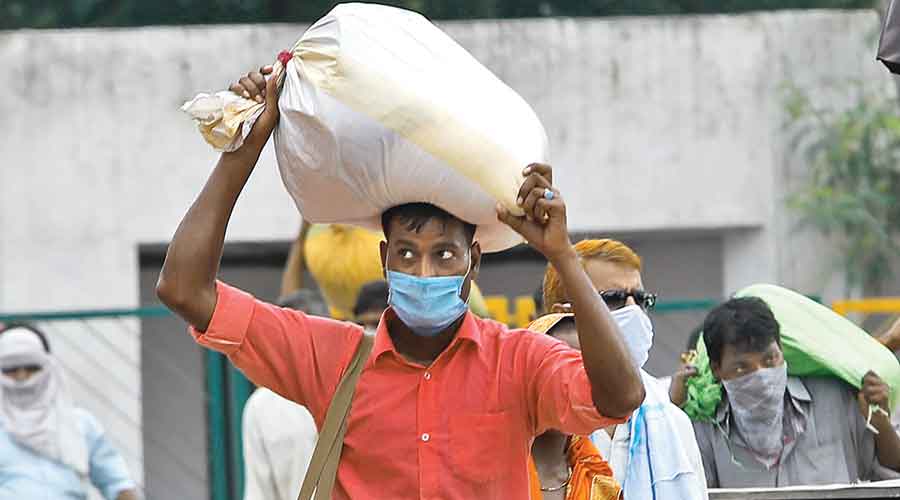The Centre on Wednesday told Parliament that it intended to create a database for unorganised-sector workers including migrants, days after facing criticism for its lack of data on the deaths of migrant workers during the lockdown.
Labour minister Santosh Gangwar’s assertions comes at a time the government’s proposed labour reform laws have dropped a longstanding but largely ignored legal requirement for the registration of migrant workers.
“Ministry of labour & employment has envisaged development of a National Database for Unorganised Workers seeded with Aadhaar for all unorganised workers,” Gangwar said in a written reply to a question from DMK member Tiruchi Siva in the Rajya Sabha.
“The project will enrol all unorganised workers including migrant workers.”
Siva had asked whether the ministry would formulate a national database for migrant workers.
Media reports have suggested that scores of migrant workers died of exhaustion or accidents while walking or hitch-hiking hundreds of miles home from their workplaces after the lockdown left them unemployed.
But on Monday, Gangwar told the Lok Sabha that the question of compensation did not arise because the government did not maintain data on people “dying on the way”.
Independent researchers have said that 972 migrant workers died while returning home between March 25, when the lockdown was announced, and July 4.
The government had no data about the migrants despite the Inter State Migrant Workmen (Regulation of Employment and Conditions of Services) Act, 1979, mandating the registration of migrant workers in their home and destination states.
Now this provision, unenforced for four decades, is set to go altogether. The Occupational Safety, Health and Working Condition Code Bill, which will subsume the 1979 law once it is enacted, does not contain the registration clause for migrant workers.
When the migrants were stuck in the various states — without jobs, money and sometimes food — neither the Centre nor their home or workplace states had any data about them. The labour contractors who had placed them in various factories were missing from the scene.
Under the 1979 law, employers and contractors are to maintain records of the migrant workers employed, wages paid and the nature of work assigned to them. Government officials are to periodically inspect the records and the facilities provided to the workers.
But the implementation of the 1979 law has been abysmal. In response to an RTI application from Anjali Bhardwaj, the labour ministry last week said that only 84,875 inter-state migrant workers had been registered, by just 372 establishments, between 2010-11 and 2019-20.
The figure of 84,875 is just 0.8 per cent of the 1.04 crore migrant workers who the government says returned to their home states after the lockdown. The government cited this figure in Parliament this week on the basis of information collected from the states.
The labour ministry’s reply to the RTI query showed that in several regions including Delhi, Dehradun, Jabalpur and Patna, not a single migrant worker had been registered in the year 2019-20.
Another recent RTI application, filed with the railway ministry, had sought data on the number of migrant workers who had died while returning home on the Shramik Special trains.
The Railway Board’s safety directorate replied that railway policing being a state subject, the registration of cases of unnatural death and their investigation were the states’ responsibility.
The board said it maintained data of casualties from train accidents, and asserted that no deaths had occurred on the Shramik trains from train accidents during the pandemic.
Altogether, three labour reform bills introduced by the labour ministry — the safety code bill, Industrial Relations Code Bill and Social Security Code Bill — are pending with Parliament. A Wage Code Bill has already been passed. These four laws will subsume the existing 44 labour laws in the country.











